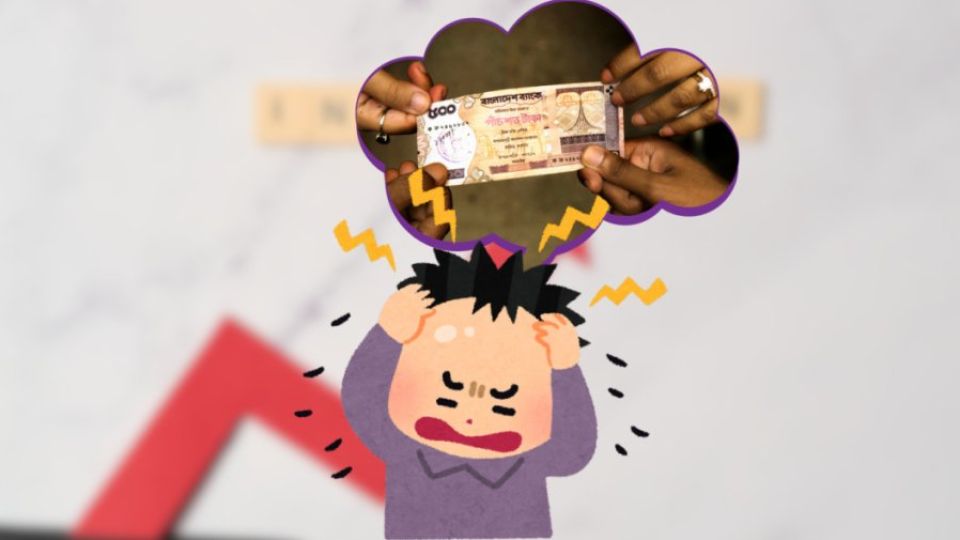January 24, 2025
DHAKA – Bangladesh is currently grappling with high inflation; soaring prices of essentials placing immense pressure on households. This financial strain has taken a toll not just on people’s wallets, but also on their mental health. The burden of unpaid loans, the fear of not being able to pay monthly bills, or the inability to provide for loved ones creates stress that often goes unnoticed, but can have serious consequences.
To understand the connection between financial challenges and mental well-being, Star Lifestyle spoke with Dr Abdul Hamid, a psychotherapist at the MONOBIKASH Foundation. Mental health, he notes, is not just about the absence of mental illness. It involves the ability to express one’s potential, use it effectively, and maintain a balance between thinking, feeling, and doing. However, financial stress often disrupts this delicate balance.
“Financial stress can affect several areas of life,” Dr Hamid further explains. “Our mental well-being depends on various domains such as physical fitness, mental and emotional health, finances, and relationships. If one of these areas does not function properly, our overall well-being gets disrupted.”
Studies show that individuals experiencing financial hardship are more likely to report mental health struggles including feelings of hopelessness, irritability, and low self-esteem. The constant stress of financial instability activates the body’s fight-or-flight response, leaving individuals in a perpetual state of heightened alertness. Over time, this chronic stress can lead to burnout, impaired cognitive function, and a weakened immune system.
Behavioural and physical manifestations
The effects of financial stress often spill into behaviour and physical health.
“People may experience mood swings, lose patience easily, or struggle with concentration. It can disrupt sleep patterns, cause restlessness, reduce appetite, or lead to overeating,” Dr Hamid clarifies.
He adds that in some cases, the stress manifests physically, causing unexplained pain or discomfort. “Although medical tests might not show any significant issues, the body reacts to the stress. This kind of stress can also severely damage intimate and personal relationships, creating a ripple effect in one’s life.”
Social factors compound these effects. Financial troubles can lead to strained relationships, social isolation, or even stigma, further intensifying feelings of inadequacy or shame. This vicious cycle can make it seem as though there’s no way out but there are effective coping strategies that can help.
Effective coping strategies
Dr Hamid emphasises the importance of healthy coping mechanisms to counter the effects of financial stress. These include —
Prioritising physical health: Physical fitness plays a vital role. Regular exercise, proper nutrition, and adequate sleep are key to reducing stress and anxiety. Neglecting physical health often leads to unhealthy behaviours, making it harder to adapt and cope with crises.
Cultivating mental fitness: Financial crises are not just personal problems; they often reflect broader systemic issues, like global economic downturns or geopolitical conflicts. Recognising this shared reality can help us feel less isolated and more resilient.
Acknowledging the larger context can foster optimism and hope, which are essential for mental resilience.
Developing a clear financial plan: While emotional support is vital, addressing the root cause of stress – financial instability – is equally important. Create a detailed budget, prioritise expenses, and set achievable financial goals. These steps not only provide clarity but also restore a sense of control.
Creating support systems: Sharing concerns with trusted individuals or support groups provides emotional ventilation. When people with similar challenges come together, it helps in creating a sense of connection and reduces feelings of isolation.
Reframing negative thoughts: Approaching negative thoughts differently and adopting a growth mindset can make a noteworthy difference.
Going through a financial crisis may test your limits but it can also be an opportunity for growth. By prioritising physical and mental health and addressing the root causes of stress, individuals can emerge stronger and more resilient. Remember seeking help is a sign of strength, not weakness. With determination and the right strategies, you can weather the storm and rebuild a brighter future.


